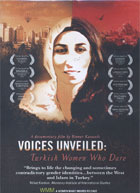
Voices Unveiled: Turkish Women who Dare 2010
Distributed by Women Make Movies, 462 Broadway, New York, NY 10013; 212-925-0606
Produced by Jill Rytie Lutz
Directed by Binnur Karaevli
DVD, color, 69 min.
College - General Adult
Gender Studies, Textiles, Human Rights, Area Studies, Middle Eastern Studies, Art, Religious Studies, Education
Date Entered: 10/12/2011
Reviewed by Gisele Tanasse, University of California BerkeleyThe back cover of the Voices Unveiled case asks: "Can Islamic values co-exist with full equality for women?" While the film fails to speak to that exact question, it does present a glimpse into the complex reality of modern day Turkey, where the experience of a woman is largely determined by whether she was born in the city or the country. A little slow to begin, most of the film is devoted to the stories and opinions of three Turkish women "who dare"—a dancer, an artist and an educator/activist. The fact that these women's stories are presented first and make up the vast majority of the film, distracts from how very disparate their experiences are from their country cousins, especially when we are presented with disturbing statistics related to Turkish women’s basic human rights. Eight million Turkish women are illiterate and between 2002 and 2007, 1,806 Turkish women were murdered in "honor killings" and 5,375 died in "honor suicides. We have a sense, however, that the professional successes of these particular women were made profoundly easier by the sheer luck of where they were born and raised. Those women from the country, who would have the most insightful perspective as to how their emerging professional lives are at odds with their religion and tradition, are unfortunately given very limited speaking time. The scope of their discussions are focused on the benefits of the projects lead by the three women "who dare," rather than their own interpersonal relationships with their families. The men are almost entirely absent from any discussion. The brief instance where the artist actually engages one of her employees in a discussion about the veil is perhaps the most telling and informative of the film: the artist does not appear at all willing to accept that her employee does not feel the veil is a burden, whereas the young employee openly acknowledges that her best friend, with the purest heart, does not wear the veil. This film would seem to be most relevant to gender and women studies courses with a focus on Middle Eastern or Islamic issues. It would equally be relevant to Turkish studies. The most valuable and fascinating components of the film are the in-depth demonstration of weaving kilim rugs and making felts in the artist's studio: for those interested in textiles, the film is highly recommended.